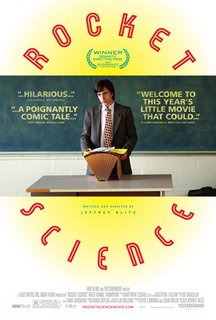
How ironic is it that
Rocket Science is the story about a young man finding his voice, yet the movie itself has no original voice of its own? Writer-director Jeffrey Blitz (2002's winning Spelling Bee documentary,
Spellbound) wants so much to bring forth memories of the films of Wes Anderson (
Rushmore,
The Royal Tenenbaums) and
Napoleon Dynamite that he shamelessly apes their formulas. There's nothing wrong with drawing inspiration from someone else's work, as long as you can give us a reason for us to sit through what we've already seen one more time.
Rocket Science is a darkly quirky comedy-drama that just doesn't work, because it can't give us enough of a reason to care.
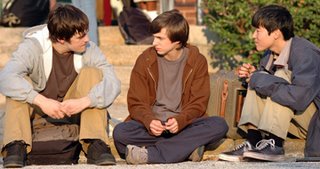
Hal Hefner (Reece Thompson) is a put-upon teen with a lot of problems in his life. He has a terrible stuttering problem, which prevents him from truly speaking his mind, and obviously makes him the target of bullying and ridicule at school. His family life is a shambles, as well. His father walks out right at the beginning the film, his mother has hooked up with a bizarre Asian man, and his older brother (Vincent Piazza) frequently physically and verbally abuses him. Into his life walks Ginny (Anna Kendrick), an intelligent and confident young woman who is a member of the school's debate team. She sees great potential in Hal, despite his verbal handicap, and seems to be determined to shape and mold him into someone who is confident in his voice and abilities. This is the first time anyone has ever believed in Hal, and he finds himself for the first time believing that he can be more than the shy, awkward teen who never says anything.
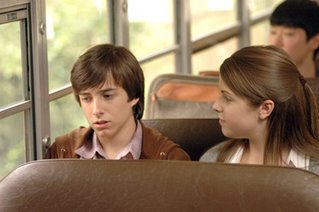
For what is being billed as a comedy,
Rocket Science has a very dark and somewhat mean streak running throughout it. This is not exactly the kind of underdog story where the shy, awkward teen rises to the top and finds success that the synopsis above would lead you to expect. Rather, it is the story of a person who finds out that life can screw you over, and learns to live with it. There's a lot to admire at the core of Rocket Science. I liked the performances, with both Reece Thompson and Anna Kendrick delivering realistic portrayals of young teens that are seemingly complex at first, and promise to have a lot more to them than we initially expect. The movie is also competently made, even if it does seem to be mimicking the style of Wes Anderson, right down to the deadpan narrator. The positives end there, however, as we peel back the movie's layers, and discover that there's just very little going on underneath. You can see potential in nearly every scene and every character, but the movie is content to skim the surface, and never quite go deep enough. It never gives us a real reason to care about these people, especially Hal, which is one of the film's biggest failings, and something that should have been corrected at the screenplay level.
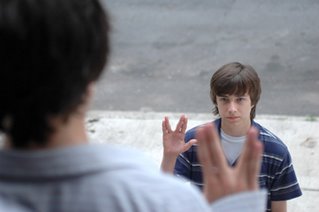
The truth is, for all of his problems, Hal never comes across as a character that we can get behind. We learn so little about him, and he gets to display so little personality that it's hard to root for him. He's highly derivative of other awkward teens that we've seen in other films just like this, such as the underrated 80s classic,
Lucas. The movie never makes him as interesting of a character that he should be, because it never quite seems to be very interested in him in the first place. It surrounds him with a cast of quirky and interesting characters that it's almost a shame when the movie keeps on going back to focus on him, when anyone else who surrounds him would have made a much more interesting protagonist. The character of Ginny is a good example. She's very complicated, and is not the angelic nice girl that you would expect in a story like this, who decides to give the outcast a chance out of the goodness of her heart. As the movie goes on, we learn that she has some personal motives, and that everything is not what it seems. Her character, and the performance by Miss Kendrick, hold the most interesting moments of the film, and it's no surprise that the movie picks up whenever she is on screen. Unfortunately, about halfway through, her appearances in the story become less frequent, and it focuses much more heavily on Hal, who could have been interesting if the screenplay was willing to go deeper with him.
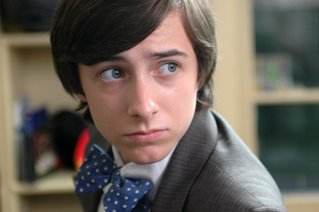
If it was just this, I might have been able to give
Rocket Science a pass for trying, but the movie just doesn't seem to hold an original bone in its body. We see elements from other films throughout that it turns into a game of "spot the reference", and we start paying more attention to what may have been the inspiration for the scene we're watching, rather than the scene itself. It's very distracting, and left me feeling bored before it was over. You keep on wanting the material to work and to find its own voice, but instead, it just keeps on putting stuff up on the screen that we have seen too many times before. The film's problems lie strictly at the screenplay level. I understand that this is Mr. Blitz's first attempt at writing a fictional screenplay (although it is apparently semi-autobiographical and based somewhat on his own experiences as a teen), and maybe he decided to play it safe. I think he played it a little too safe here. He seems to want to break through and do something really great with these characters. We can see it from time to time, especially during some of Ginny's finer moments in the film. He just keeps on holding us back, and holding back his own creation as well.
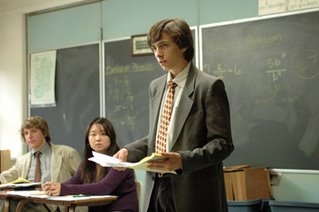 Rocket Science
Rocket Science has already become the critic's darling, and has been honored at film festivals, but I personally see an Emperor without any clothes. This is not a terrible movie, just one that should have found its own voice instead of trying to be like everyone else. I didn't laugh very much, and I didn't care for the characters most of the time. When it was over, I was thinking more about what it could have been rather than what it was. I hate it when I walk out of a movie thinking things like that. I want to walk out thinking about the director's vision, and the story I just saw. Here, all I was thinking about was it was a shame the director couldn't find his own voice to tell the story he wanted to.
0 comments
 How ironic is it that Rocket Science is the story about a young man finding his voice, yet the movie itself has no original voice of its own? Writer-director Jeffrey Blitz (2002's winning Spelling Bee documentary, Spellbound) wants so much to bring forth memories of the films of Wes Anderson (Rushmore, The Royal Tenenbaums) and Napoleon Dynamite that he shamelessly apes their formulas. There's nothing wrong with drawing inspiration from someone else's work, as long as you can give us a reason for us to sit through what we've already seen one more time. Rocket Science is a darkly quirky comedy-drama that just doesn't work, because it can't give us enough of a reason to care.
How ironic is it that Rocket Science is the story about a young man finding his voice, yet the movie itself has no original voice of its own? Writer-director Jeffrey Blitz (2002's winning Spelling Bee documentary, Spellbound) wants so much to bring forth memories of the films of Wes Anderson (Rushmore, The Royal Tenenbaums) and Napoleon Dynamite that he shamelessly apes their formulas. There's nothing wrong with drawing inspiration from someone else's work, as long as you can give us a reason for us to sit through what we've already seen one more time. Rocket Science is a darkly quirky comedy-drama that just doesn't work, because it can't give us enough of a reason to care. Hal Hefner (Reece Thompson) is a put-upon teen with a lot of problems in his life. He has a terrible stuttering problem, which prevents him from truly speaking his mind, and obviously makes him the target of bullying and ridicule at school. His family life is a shambles, as well. His father walks out right at the beginning the film, his mother has hooked up with a bizarre Asian man, and his older brother (Vincent Piazza) frequently physically and verbally abuses him. Into his life walks Ginny (Anna Kendrick), an intelligent and confident young woman who is a member of the school's debate team. She sees great potential in Hal, despite his verbal handicap, and seems to be determined to shape and mold him into someone who is confident in his voice and abilities. This is the first time anyone has ever believed in Hal, and he finds himself for the first time believing that he can be more than the shy, awkward teen who never says anything.
Hal Hefner (Reece Thompson) is a put-upon teen with a lot of problems in his life. He has a terrible stuttering problem, which prevents him from truly speaking his mind, and obviously makes him the target of bullying and ridicule at school. His family life is a shambles, as well. His father walks out right at the beginning the film, his mother has hooked up with a bizarre Asian man, and his older brother (Vincent Piazza) frequently physically and verbally abuses him. Into his life walks Ginny (Anna Kendrick), an intelligent and confident young woman who is a member of the school's debate team. She sees great potential in Hal, despite his verbal handicap, and seems to be determined to shape and mold him into someone who is confident in his voice and abilities. This is the first time anyone has ever believed in Hal, and he finds himself for the first time believing that he can be more than the shy, awkward teen who never says anything. For what is being billed as a comedy, Rocket Science has a very dark and somewhat mean streak running throughout it. This is not exactly the kind of underdog story where the shy, awkward teen rises to the top and finds success that the synopsis above would lead you to expect. Rather, it is the story of a person who finds out that life can screw you over, and learns to live with it. There's a lot to admire at the core of Rocket Science. I liked the performances, with both Reece Thompson and Anna Kendrick delivering realistic portrayals of young teens that are seemingly complex at first, and promise to have a lot more to them than we initially expect. The movie is also competently made, even if it does seem to be mimicking the style of Wes Anderson, right down to the deadpan narrator. The positives end there, however, as we peel back the movie's layers, and discover that there's just very little going on underneath. You can see potential in nearly every scene and every character, but the movie is content to skim the surface, and never quite go deep enough. It never gives us a real reason to care about these people, especially Hal, which is one of the film's biggest failings, and something that should have been corrected at the screenplay level.
For what is being billed as a comedy, Rocket Science has a very dark and somewhat mean streak running throughout it. This is not exactly the kind of underdog story where the shy, awkward teen rises to the top and finds success that the synopsis above would lead you to expect. Rather, it is the story of a person who finds out that life can screw you over, and learns to live with it. There's a lot to admire at the core of Rocket Science. I liked the performances, with both Reece Thompson and Anna Kendrick delivering realistic portrayals of young teens that are seemingly complex at first, and promise to have a lot more to them than we initially expect. The movie is also competently made, even if it does seem to be mimicking the style of Wes Anderson, right down to the deadpan narrator. The positives end there, however, as we peel back the movie's layers, and discover that there's just very little going on underneath. You can see potential in nearly every scene and every character, but the movie is content to skim the surface, and never quite go deep enough. It never gives us a real reason to care about these people, especially Hal, which is one of the film's biggest failings, and something that should have been corrected at the screenplay level. The truth is, for all of his problems, Hal never comes across as a character that we can get behind. We learn so little about him, and he gets to display so little personality that it's hard to root for him. He's highly derivative of other awkward teens that we've seen in other films just like this, such as the underrated 80s classic, Lucas. The movie never makes him as interesting of a character that he should be, because it never quite seems to be very interested in him in the first place. It surrounds him with a cast of quirky and interesting characters that it's almost a shame when the movie keeps on going back to focus on him, when anyone else who surrounds him would have made a much more interesting protagonist. The character of Ginny is a good example. She's very complicated, and is not the angelic nice girl that you would expect in a story like this, who decides to give the outcast a chance out of the goodness of her heart. As the movie goes on, we learn that she has some personal motives, and that everything is not what it seems. Her character, and the performance by Miss Kendrick, hold the most interesting moments of the film, and it's no surprise that the movie picks up whenever she is on screen. Unfortunately, about halfway through, her appearances in the story become less frequent, and it focuses much more heavily on Hal, who could have been interesting if the screenplay was willing to go deeper with him.
The truth is, for all of his problems, Hal never comes across as a character that we can get behind. We learn so little about him, and he gets to display so little personality that it's hard to root for him. He's highly derivative of other awkward teens that we've seen in other films just like this, such as the underrated 80s classic, Lucas. The movie never makes him as interesting of a character that he should be, because it never quite seems to be very interested in him in the first place. It surrounds him with a cast of quirky and interesting characters that it's almost a shame when the movie keeps on going back to focus on him, when anyone else who surrounds him would have made a much more interesting protagonist. The character of Ginny is a good example. She's very complicated, and is not the angelic nice girl that you would expect in a story like this, who decides to give the outcast a chance out of the goodness of her heart. As the movie goes on, we learn that she has some personal motives, and that everything is not what it seems. Her character, and the performance by Miss Kendrick, hold the most interesting moments of the film, and it's no surprise that the movie picks up whenever she is on screen. Unfortunately, about halfway through, her appearances in the story become less frequent, and it focuses much more heavily on Hal, who could have been interesting if the screenplay was willing to go deeper with him. If it was just this, I might have been able to give Rocket Science a pass for trying, but the movie just doesn't seem to hold an original bone in its body. We see elements from other films throughout that it turns into a game of "spot the reference", and we start paying more attention to what may have been the inspiration for the scene we're watching, rather than the scene itself. It's very distracting, and left me feeling bored before it was over. You keep on wanting the material to work and to find its own voice, but instead, it just keeps on putting stuff up on the screen that we have seen too many times before. The film's problems lie strictly at the screenplay level. I understand that this is Mr. Blitz's first attempt at writing a fictional screenplay (although it is apparently semi-autobiographical and based somewhat on his own experiences as a teen), and maybe he decided to play it safe. I think he played it a little too safe here. He seems to want to break through and do something really great with these characters. We can see it from time to time, especially during some of Ginny's finer moments in the film. He just keeps on holding us back, and holding back his own creation as well.
If it was just this, I might have been able to give Rocket Science a pass for trying, but the movie just doesn't seem to hold an original bone in its body. We see elements from other films throughout that it turns into a game of "spot the reference", and we start paying more attention to what may have been the inspiration for the scene we're watching, rather than the scene itself. It's very distracting, and left me feeling bored before it was over. You keep on wanting the material to work and to find its own voice, but instead, it just keeps on putting stuff up on the screen that we have seen too many times before. The film's problems lie strictly at the screenplay level. I understand that this is Mr. Blitz's first attempt at writing a fictional screenplay (although it is apparently semi-autobiographical and based somewhat on his own experiences as a teen), and maybe he decided to play it safe. I think he played it a little too safe here. He seems to want to break through and do something really great with these characters. We can see it from time to time, especially during some of Ginny's finer moments in the film. He just keeps on holding us back, and holding back his own creation as well. Rocket Science has already become the critic's darling, and has been honored at film festivals, but I personally see an Emperor without any clothes. This is not a terrible movie, just one that should have found its own voice instead of trying to be like everyone else. I didn't laugh very much, and I didn't care for the characters most of the time. When it was over, I was thinking more about what it could have been rather than what it was. I hate it when I walk out of a movie thinking things like that. I want to walk out thinking about the director's vision, and the story I just saw. Here, all I was thinking about was it was a shame the director couldn't find his own voice to tell the story he wanted to.
Rocket Science has already become the critic's darling, and has been honored at film festivals, but I personally see an Emperor without any clothes. This is not a terrible movie, just one that should have found its own voice instead of trying to be like everyone else. I didn't laugh very much, and I didn't care for the characters most of the time. When it was over, I was thinking more about what it could have been rather than what it was. I hate it when I walk out of a movie thinking things like that. I want to walk out thinking about the director's vision, and the story I just saw. Here, all I was thinking about was it was a shame the director couldn't find his own voice to tell the story he wanted to.






0 Comments:
Post a Comment
<< Home